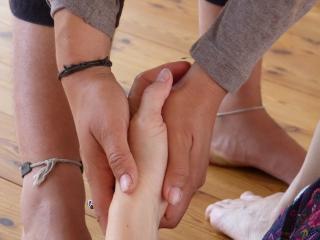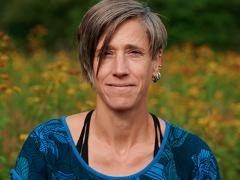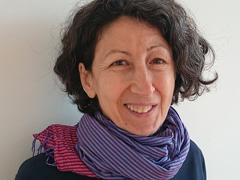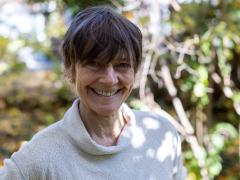
c.a.r.e.- movement, balance and creation
Training in somatic developmental pedagogy
c.a.r.e. is an advanced training for the orientation of pedagogical work towards basic somatic knowledge in the context of human development (focus: child and adolescent phase).
At the heart of c.a.r.e.- movement, balance and creation is an understanding of the human development process. By working with early childhood reflexes, embryonic development and the basics of self-regulation, dysfunctional survival strategies can be recognized and participants can be offered movement activities that strengthen functional movement patterns and resilience.
In the three modules, participants gain expertise on the development of the child and adolescent phase and in particular the neuroplasticity of the brain through movement and learning, the neurochemistry (the hormonal aspects) of perception as well as liveliness and embodied creativity. The modules are based on human development in the infant, child and adolescent phases and delve into specific content.
Benefit of the training
Participants acquire a sound embodied knowledge of the human development process, particularly in the child and adolescent phase. They gain a fundamental knowledge of age-specific developmental processes based on findings from neuroscience, education, psychology and somatics. Principles of the following somatic methods are incorporated:
● Feldenkrais Method
● Body-Mind Centering®
● Authentic Movement
● Improvisation
● Contact Improvisation
● INPP (Neurophysiological Psychology)
In the somatic methods, content is experienced practically. Lessons include anatomical information and theoretical background knowledge that is explored through movement, touch, group and partner work. The practical instructions serve an embodied understanding of the material. The training also leads to a deeper, subtle experience of one's own body. The somatic-embodied penetration of the principles of somatic approaches is the prerequisite for their further transmission.
Participants acquire basic developmental knowledge that aligns their pedagogical approach with somatic work. They learn how to incorporate this into practical teaching in their own teaching experiences. They improve their teaching skills with the help of various feedback methods. Using observation and analysis methods, they learn to read the participants' body language and adapt their teaching to this analysis. To complete the course, they design a teaching sequence, observe 10 lessons and complete a case study. Participation is certified upon successful completion (teaching a somatic lesson, 10 observations, case study).
Curriculum
3 modules à 5 days, each from 10:00am - 05:30pm
Who is this training course for?
The training is aimed at people who would like to go into the further teaching and application of somatic movement offers with a specialization in human development processes. In particular, professionals from therapeutic, educational and social occupational fields are addressed.
Credit: Doherty Lorenza
Ausführliche Seminarinformationen
Participants acquire a sound embodied knowledge of the human development process, particularly in the child and adolescent phase. They gain a fundamental knowledge of age-specific developmental processes based on findings from neuroscience, education, psychology and somatics.
By working with early childhood reflexes, embryonic development and the basics of self-regulation, dysfunctional survival strategies can be recognized and participants can be offered movement opportunities that strengthen functional movement patterns and resilience. In the three modules, participants gain expertise on the development of the childhood and adolescent phase and in particular the neuroplasticity of the brain through movement and learning, the neurochemistry (the hormonal aspects) of perception as well as liveliness and embodied creativity. Each of the three modules is dedicated to specific topics. The modules are geared towards human development in the infant, child and
adolescent phases and delve into specific content.
Seminarleiter*innen

Heike Kuhlmann
www.heikekuhlmann.net
MSME, BMC®-Practitioner, dancer, -educator, choreographer, MA Performance Studies/Choreography
Heike is interested in the unfolding process of human beings. It is more than the individual unfolding, but in how people can meet each other at eye level through personal development and inclusion of structural conditions in her somatic facilitations. Being a condition to become Critical Somatics. She accompanies somatic processes in individual sessions, courses, workshops and trainings. Activism and somatics are interwoven in her artistic work. More information on: www.somatik-tanz-choreographie.de, www.heikekuhlmann.net

Adalisa Menghini
Teacher, choreographer, performer
Adalisa studied at the S.N.D.O in Amsterdam, after which she completed her M.A. in Neurophysiological Psychology. She is a teacher of the Feldenkrais Method. She works with professional and non-professional dancers, children and seniors. She was nominated twice as best choreographer of the "Giocabriga". In collaboration with K. Wickenhäuser, she has brought performances with school children to museums. Twice they have won the "Kinder zum Olymp!" award. She teaches at the Tanzfabrik, the Somatic Academy Berlin and at the Berlin University of the Arts.

Ka Rustler
Ka Rustler has been performing, researching and analyzing somatic practices and their embodiment in movement, choreography and therapy for over 30 years. BMC® Teacher
Kosten
Anmeldeinformationen
BerlinSomatische Akademie Berlin
Paul-Lincke-Ufer 30
10999 Berlin | side building
1st backyard
4th floor
- Full Price: 2300.00 EUR
This training is eligible for funding via KOMPASS, a program of the Federal Ministry of Labour and Social Affairs. It supports self-employed people in becoming crisis-proof and future-proof through further qualifications. Please check first whether you are eligible for KOMPASS funding >> Checklist
---
Interested self-employed people may contact one of the contact points listed here to apply for funding.
>> Contact points to apply for funding via KOMPASS
You can find all important information on KOMPASS funding here.
Foto by: Doherty Lorenza
